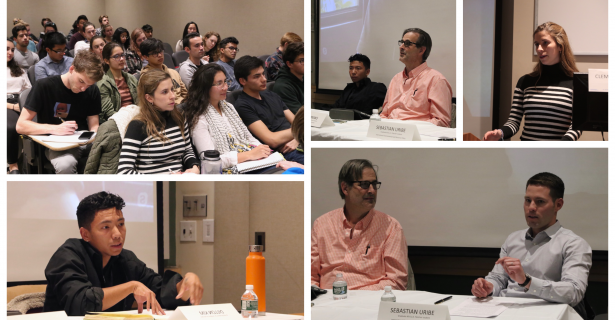On the afternoon of October 16th, the Latin American Committee at Tufts (LAC) hosted its first panel of the semester to discuss the causes and implications of the Amazon Rainforest fires, which have burned down over 2.2 million acres of primary and secondary forests in 2019 alone. The panelists, Dr. Colin Orians, Sebastian Uribe, Dillon Kim, and Clemencia Pinasco (via Skype), shared their expertise on the matter through environmental, economic, and social lenses with a standing-room only crowd.
Professor Orians, whose research focuses on global change biology with an emphasis on climate change, species invasion, and agroecology, stressed the high value of the Amazon as a biological asset. He described the region as a “museum and a cradle of innovation”, highlighting the importance of both learning from its history and preserving it for the future.
Sebastián Uribe, a Master of Arts in Law and Diplomacy (M.A.L.D.) student at The Fletcher School, tackled the subject through political and economical lenses. He discussed the involvement of the United Nations Programme on Reducing Emissions from Deforestation and Forest Degradation + (REDD+) in the Amazon fires. Uribe also outlined how western powers provide financial incentives to Latin American governments to preserve their rainforests, although the support is often tied to political constraints.
Dillon Kim, also a Master of Arts in Law and Diplomacy (M.A.L.D.) student at The Fletcher School, highlighted the relevance of discussing the effect the fires have had on the Indigenous communities. He agreed with the other panelists on the biological value of this territory, but then expanded it into a social context, describing how deforestation and wildfires disrupt the lives of the Amazon’s inhabitants, who have coexisted with the forest for centuries.
Clemencia Pinasco, a Tufts and IGL alumna currently working at the Alliance for Research and Conservation in the Amazon, offered her current field expertise on the topic. She clarified that the fires are nothing new to the region, but instead a worsening catastrophe that ignites every year during the dry season. She added that the lack of political backing on the conservation of the rainforests is worrying, and she hopes that the expanding news coverage will pressure the governments to act upon it.
After the panelists discussed their different perspectives on the topic, the audience had the opportunity to ask specific questions and share concerns. The speakers then explained that, although difficult, it is vital to align the interests of businesses and activists to preserve the Amazon, and that industries like eco-tourism could serve as viable alternatives. They also shared the concept of the tipping-point, which in environmental studies refers to the nonlinear behavior of environmental deterioration, which makes it difficult to predict future ramifications based on historical data.
The overall significance of the panel relied not only on the macro-level discussion of the Amazon Rainforest but rather the specific economic, cultural, and environmental aspects that make this issue such a relevant and complex topic in Latin America.

